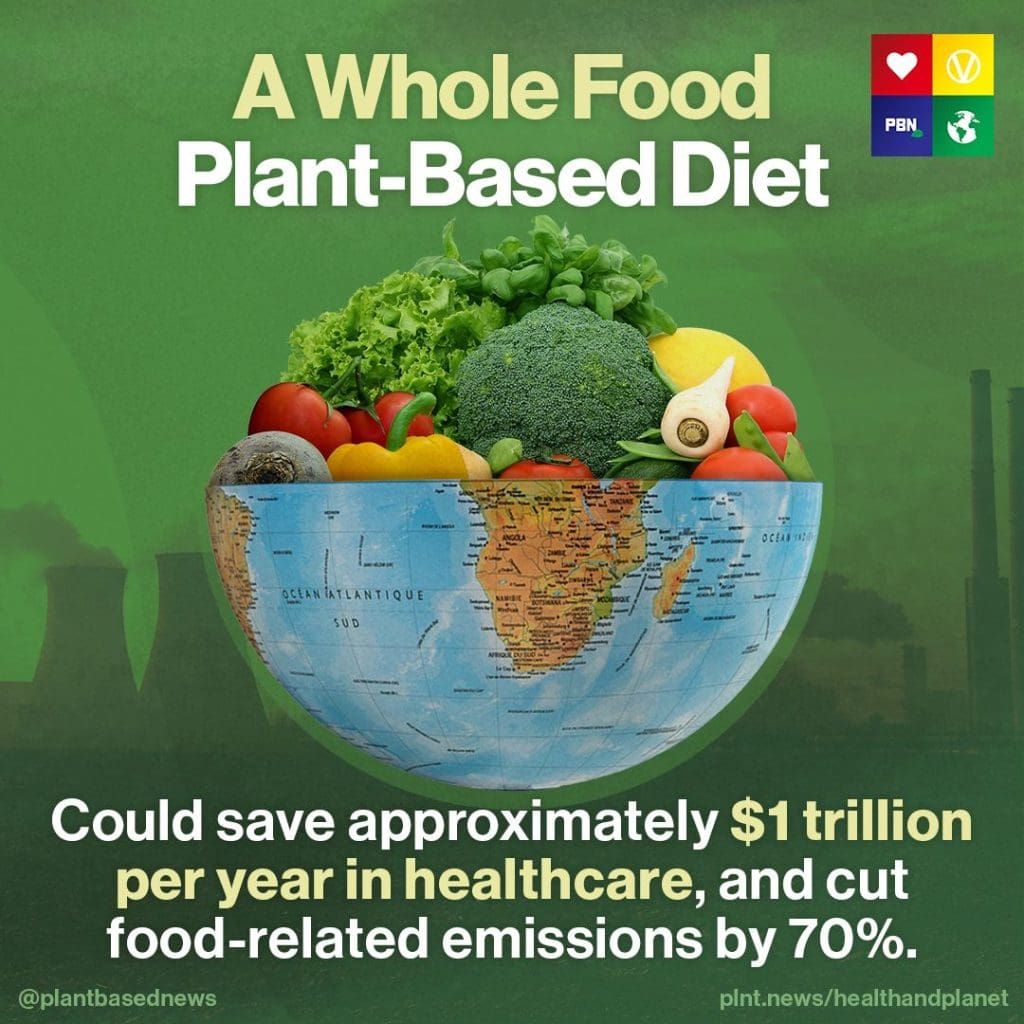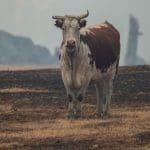Ketika kekhawatiran mengenai perubahan iklim dan degradasi lingkungan terus meningkat, menjadi semakin jelas bahwa kita perlu melakukan perubahan signifikan dalam kehidupan sehari-hari untuk melindungi dan melestarikan planet kita. Salah satu area di mana kita dapat memberikan dampak besar adalah pada pilihan makanan kita. Peternakan hewan dan produksi produk hewani telah diidentifikasi sebagai kontributor utama emisi gas rumah kaca, penggundulan hutan, kelangkaan air, dan hilangnya keanekaragaman hayati. Dalam postingan ini, kita akan mengeksplorasi dampak produk hewani terhadap lingkungan dan mengapa sangat penting untuk mengucapkan selamat tinggal pada produk-produk ini demi planet kita. Dengan menerapkan alternatif yang berkelanjutan dan beralih ke pola makan nabati, kita dapat memberikan dampak positif terhadap lingkungan dan menciptakan masa depan yang lebih sehat bagi diri kita sendiri dan generasi mendatang.

Dampak Lingkungan dari Produk Hewani
Peternakan hewan berkontribusi terhadap emisi gas rumah kaca, termasuk metana dan karbon dioksida.
Peternakan hewan membutuhkan sejumlah besar lahan, air, dan sumber daya energi.
Produksi produk hewani menyebabkan pencemaran udara, air, dan tanah.
Deforestasi sering kali disebabkan oleh pembukaan lahan untuk peternakan.
Limbah yang dihasilkan dari peternakan dapat mencemari sumber air di sekitarnya.
Menjelajahi Alternatif Berkelanjutan untuk Produk Hewani
Ada berbagai sumber protein nabati yang tersedia sebagai alternatif pengganti produk hewani. Ini termasuk kacang-kacangan, tahu, tempe, seitan, dan pengganti daging nabati. Pola makan nabati dapat menyediakan semua nutrisi yang diperlukan untuk gaya hidup sehat, termasuk protein, zat besi, dan vitamin.
Alternatif berkelanjutan terhadap produk hewani dapat membantu mengurangi emisi gas rumah kaca. Peternakan merupakan kontributor utama pemanasan global, dan mengurangi permintaan produk hewani dapat memberikan dampak yang signifikan terhadap mitigasi perubahan iklim.
Pangan nabati juga membutuhkan lebih sedikit sumber daya lahan dan air dibandingkan dengan peternakan hewan. Selain itu, budidaya tanaman pangan seringkali lebih ramah lingkungan, karena polusi dan degradasi tanah lebih sedikit.
Dengan mengeksplorasi dan memanfaatkan alternatif produk hewani yang berkelanjutan, kita dapat berkontribusi terhadap bumi yang lebih sehat untuk generasi mendatang.
Pengaruh Peternakan terhadap Perubahan Iklim
Peternakan merupakan penyumbang emisi gas rumah kaca global yang signifikan. Peternakan menghasilkan metana, gas rumah kaca yang kuat, melalui fermentasi enterik. Selain itu, transportasi dan pengolahan produk hewani juga berkontribusi terhadap emisi karbon.
Dengan mengurangi konsumsi daging dan beralih ke pola makan nabati, individu dapat membantu mitigasi perubahan iklim. Pola makan nabati memiliki jejak karbon yang lebih rendah dibandingkan dengan pola makan kaya produk hewani. Pergeseran ini dapat memberikan dampak positif dalam mengurangi emisi gas rumah kaca dan memerangi perubahan iklim.

Pentingnya Pola Makan Nabati untuk Kesehatan Planet Kita
Pola makan nabati telah dikaitkan dengan penurunan tingkat penyakit kronis, seperti penyakit jantung dan obesitas. Dengan beralih ke pola makan nabati, kita dapat meningkatkan kesehatan masyarakat dan mengurangi biaya perawatan kesehatan.
Selain manfaat kesehatan, pola makan nabati juga mempunyai dampak positif terhadap lingkungan. Produksi pangan nabati tidak memerlukan banyak sumber daya dan tidak merusak lingkungan dibandingkan dengan peternakan hewan.
Pola makan nabati juga dapat membantu menghemat air dan mengurangi polusi air. Memproduksi produk hewani memerlukan air dalam jumlah besar untuk hidrasi hewan dan pakan tanaman. Dengan memilih opsi nabati , kita dapat berkontribusi terhadap pengelolaan air berkelanjutan.
Selain itu, pilihan nabati mendukung sistem pangan berkelanjutan dan mengurangi permintaan produk hewani. Hal ini penting untuk konservasi keanekaragaman hayati karena peternakan berkontribusi terhadap perusakan habitat dan polusi, yang menyebabkan hilangnya keanekaragaman hayati.
Kesimpulannya, peralihan ke pola makan nabati tidak hanya bermanfaat bagi kesehatan kita tetapi juga penting bagi kesehatan planet kita. Memilih opsi nabati dapat membantu mengurangi emisi gas rumah kaca, menghemat air, dan mendorong restorasi keanekaragaman hayati dan ekosistem.
Hubungan Antara Peternakan dan Deforestasi
Peternakan merupakan penyebab utama deforestasi, khususnya di wilayah seperti hutan hujan Amazon. Pembukaan lahan untuk peternakan sering kali mengakibatkan rusaknya ekosistem yang berharga, yang mengakibatkan hilangnya keanekaragaman hayati dan rusaknya habitat. Ekspansi peternakan hewan menimbulkan ancaman besar terhadap hutan global.
Dengan beralih dari produk hewani, kita dapat membantu melindungi hutan dan ekosistemnya. Memilih opsi nabati dapat memainkan peran penting dalam mengurangi deforestasi dan melestarikan keanekaragaman hayati.

Mengatasi Kelangkaan Air Melalui Peralihan dari Produk Hewani
Peternakan merupakan konsumen sumber daya air yang signifikan, sehingga berkontribusi terhadap kelangkaan air. Memproduksi produk hewani memerlukan air dalam jumlah besar untuk hidrasi hewan dan pakan tanaman. Penggunaan air yang berlebihan ini membebani persediaan air yang sudah terbatas dan memperburuk masalah kelangkaan air.
Kelangkaan air dapat menimbulkan dampak buruk terhadap pertanian, ekosistem, dan populasi manusia. Terbatasnya akses terhadap air bersih dapat menghambat produktivitas pertanian, sehingga menyebabkan kekurangan pangan dan ketidakstabilan ekonomi. Hal ini juga berdampak pada ekosistem, karena kelangkaan air dapat mengganggu habitat perairan dan membahayakan spesies yang rentan.

Transisi ke pola makan nabati dapat membantu menghemat air dan mengurangi kelangkaan air. Makanan nabati membutuhkan lebih sedikit air dibandingkan dengan produksi produk hewani. Dengan memilih opsi nabati, individu dapat berkontribusi terhadap pengelolaan air berkelanjutan dan mengurangi tekanan pada sumber daya air.
Mengurangi penggunaan air dalam peternakan juga merupakan langkah penting dalam mengatasi kelangkaan air. Menerapkan teknik penghematan air dan meningkatkan praktik pengelolaan air di peternakan dapat membantu menghemat air dan meminimalkan dampaknya terhadap kelangkaan air.
Mempromosikan Restorasi Keanekaragaman Hayati dan Ekosistem dengan Pilihan Berbasis Tanaman
Peternakan berkontribusi terhadap hilangnya keanekaragaman hayati melalui perusakan habitat dan polusi. Perluasan peternakan mengurangi habitat alami berbagai spesies tumbuhan dan hewan.

Pilihan berbasis tanaman mendorong restorasi ekosistem dengan mengurangi permintaan produk hewani. Dengan mengonsumsi makanan nabati , kita dapat membantu menciptakan pergeseran pasar menuju pilihan yang lebih berkelanjutan dan ramah lingkungan.
Melestarikan keanekaragaman hayati sangat penting bagi kesehatan dan ketahanan ekosistem secara keseluruhan. Hal ini memungkinkan keseimbangan berbagai spesies tumbuhan dan hewan, meningkatkan stabilitas ekologi dan ketahanan terhadap gangguan.
Peralihan ke pola makan nabati dapat membantu melestarikan keanekaragaman hayati dan memulihkan ekosistem. Dengan memilih opsi nabati, kita dapat berkontribusi terhadap perlindungan dan pemulihan beragam ekosistem di planet kita.
Kesimpulan
Jelas bahwa mengucapkan selamat tinggal pada produk hewani sangatlah penting demi planet kita. Dampak lingkungan dari peternakan sangat signifikan, mulai dari kontribusinya terhadap emisi gas rumah kaca hingga polusi udara, air, dan tanah. Namun, terdapat alternatif berkelanjutan selain produk hewani yang dapat membantu mengurangi masalah ini. Pola makan nabati tidak hanya menyediakan semua nutrisi yang diperlukan untuk gaya hidup sehat tetapi juga membutuhkan lebih sedikit sumber daya dan memiliki jejak karbon yang lebih rendah. Dengan beralih ke pilihan nabati, kita dapat memerangi perubahan iklim, meningkatkan kesehatan masyarakat, melindungi hutan dan keanekaragaman hayati, melestarikan air, dan memulihkan ekosistem. Sudah waktunya bagi kita untuk mengambil tindakan dan melakukan perubahan positif demi masa depan planet kita.
















































